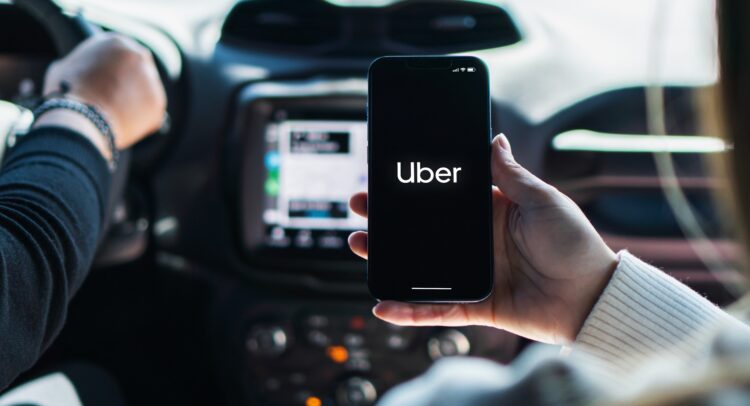Uber Technologies (NASDAQ:UBER) has seen its stock rally by nearly 76% year-to-date. While recent positive developments have fueled this rally, the company remains hampered by persistent challenges, particularly in terms of profitability and elevated stock-based compensation levels. Given these lingering issues, I believe the exuberant stock rally may be nothing more than a bubble about to burst. Accordingly, I am bearish on the stock.
Meet Your ETF AI Analyst
- Discover how TipRanks' ETF AI Analyst can help you make smarter investment decisions
- Explore ETFs TipRanks' users love and see what insights the ETF AI Analyst reveals about the ones you follow.

Revenue Growth Cannot Conceal Uber’s Issues
Despite Uber’s ongoing revenue growth, the underlying lack of meaningful profits and consistent dilution cannot be concealed. Let’s take a closer look.
Revenue Growth
The revived excitement around Uber stock these days can be largely attributed to Uber sustaining robust revenue growth. Indeed, in its most recent Q2 results, the company recorded $9.2 billion in revenues, up 14% year-over-year. In constant currency, revenues actually grew by 17%.
This growth is a testament to the company’s strength across the board. Notably, Uber’s Mobility Trips soared by 26% compared to the previous year, fueled by a robust performance in all markets, as consumer engagement continued its upward trajectory. Specifically, monthly trips per monthly active platform consumers (MAPC) reached 5.4, marking an 8% increase during this period.
In its Delivery segment, the acceleration of gross bookings growth in Q2 was nice to see, with a notable 14% year-over-year increase. This increase was driven by compelling underlying trends, including basket inflation contributing to growth in order dollars. Furthermore, delivery frequency hit an all-time high, with an impressive four monthly orders per eater, reflecting an 8% uptick compared to Q2 2022.
Lastly, Uber’s Advertising division achieved significant scaling, reaching an impressive $650+ million revenue run rate. The introduction of New Verticals Sponsored Items in key markets such as the U.S., Canada, France, and Australia has empowered advertisers to showcase priority products within the Uber Eats app. Management is optimistic that this initiative will enhance the discoverability of relevant products and brands for consumers, with plans to expand this ad format globally.
Lack of Meaningful Profits & Dilution
Uber’s performance in Q2 underscored its continued dominance in the ridesharing and transportation services sector, reaffirming its market-leading position. Nevertheless, it’s mysterious to observe investors overlooking two critical issues that could potentially erode shareholder value — Uber’s lack of substantial profits and its reluctance to control stock-based compensation.
Despite Uber seemingly reporting net income of $394 million in Q2, it’s crucial to recognize that this figure was heavily boosted by a $386 million net benefit adjustment tied to Uber’s equity investments. This $386 million can be broken down into the following adjustments:
- a $466 million unrealized gain on Uber’s Aurora investment
- a $225 million unrealized gain on Uber’s Grab investment
- a $151 million unrealized gain on Uber’s Joby investment
- which were partially offset by a $461 million unrealized loss on Uber’s Didi investment
So essentially, the company broke even. The $326 million in operating income implies a weak operating margin of just 3.53%. It’s important not to be misled by the apparent $916 billion in “Adjusted EBITDA,” as this metric incorporates $504 million in stock-based compensation. This leads us to another persistent issue — excessive stock-based compensation.
Despite Uber’s maturing operations and substantial scale, management persists in granting remarkably high compensation packages to themselves and their staff. In Q2, stock-based compensation increased to $504 million, up from $470 million in the prior year, signaling a concerning trend.
While the market may currently be overlooking this, stock-based compensation represents a tangible expense and a potential silent threat to shareholders’ prospects for actual returns.
Uber’s Valuation is a Bubble About to Burst
Despite Uber’s razor-thin profit margins and dilutive stock-based compensation practices, investors are still willing to pay a premium valuation for its shares. Wall Street expects that the company will post EPS of $0.37 this year and $1.07 in Fiscal 2024. Yet, even in light of this anticipated boost in earnings, investors find themselves paying a substantial 43 times next year’s projected earnings.
Obviously, this is a very rich multiple, even for a company growing in the mid-teens. This becomes even more apparent given the somewhat manipulative nature of Uber’s earnings, adding an additional layer of scrutiny to the rich multiple being paid by investors. Thus, it’s not far-fetched to presume that Uber’s valuation is a bubble with some probability of busting.
Is UBER Stock a Buy, According to Analysts?
As far as Wall Street’s view on the stock goes, Uber Technologies features a Strong Buy consensus rating based on 31 Buys and one Hold recommendation assigned in the past three months. At $59.47, the average Uber Technologies stock forecast suggests 33.1% upside potential.
If you’re wondering which analyst you should follow if you want to buy and sell UBER stock, the most profitable analyst covering the stock (on a one-year timeframe) is Brad Erickson from RBC Capital, with an average return of 23.5% per rating and a 71% success rate.

The Takeaway
Uber has experienced an impressive stock rally this year, fueled by robust revenue growth and expansion into various segments of the transportation and delivery market. However, it’s essential to approach this enthusiasm with caution. The company’s profitability remains elusive, with net income largely bolstered by non-recurring gains and stock-based compensation levels that continue to rise.
In the meantime, the stock’s current valuation appears unjustified, given these underlying issues and the uncertainty they introduce. Hence, I suggest that investors be mindful that Uber’s valuation may have inflated into a bubble that could burst.
















